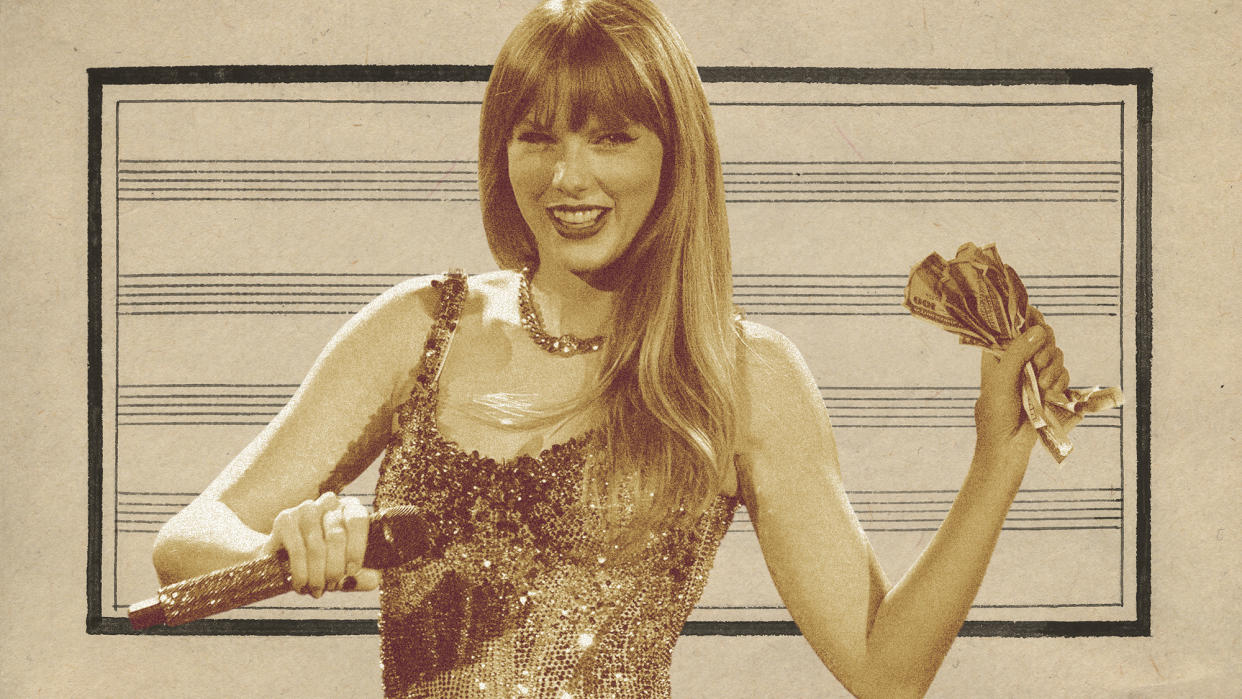How Taylor Swift changed copyright negotiations in music

- Oops!Something went wrong.Please try again later.
Over the course of her career, Taylor Swift has established herself as a prominent voice in the music industry. She has been successful at building a loyal following, evident by the outpouring of love from Swifties during her "Eras" tour and the broken records following the release of Taylor's Versions for four of her six older albums. Swift shows no signs of slowing down, surprising her fans on April 19 with a secret double album release of "Tortured Poets Department" and "TTPD: The Anthology." What started as a public spat over ownership of her music — the reason for these album rerecordings — has evolved into a major shift in the way intellectual property is considered in artist contract negotiations.
How the music industry typically divides ownership
Regarding music ownership, there are multiple layers to consider for copyright negotiations. The rights to a song are split into separate copyrights for the musical work itself and the original recorded performance of the work. The former, which encompasses the lyrics and musical composition of the song, is usually controlled by the artist, composer or songwriter. The original recorded tracks, or 'master recordings,' are generally controlled by the record label distributing the project. When the song is played in public, one or both of the copyright holders get paid.
For many songs, there are multiple copyright holders or recordings of the same song. "From a licensing point of view, this can be a nightmare," attorney Gary Greenstein said at a lunchtime talk at Harvard Law School. This can complicate matters, particularly regarding who has permission to play the song publicly.
Tensions between artists and record labels over ownership of their master recordings have existed for years. Still, Taylor Swift's public beef with her longtime business nemesis, Scooter Braun, shed new light on artist rights. Shortly after leaving her original label, Big Machine, in 2018, the owners sold the company to Braun, including the masters of Swift's first six albums. Braun, in turn, sold Big Machine and Swift's masters along with it to another company, Shamrock Holdings, for $420 million. Swift then announced that she would rerecord all the albums in order to own them completely under her new record deal with Universal Music Group.
What Taylor Swift may have changed for good
So far, Swift has rerecorded four of her original albums between 2021 and 2023, dubbed Taylor's Versions, setting a new precedent for artists fighting over ownership of their music. It's also significant that she did not release the first Taylor's Version until she'd been out of Big Machine for three years, Greenstein said. Before then, she was not allowed to rerecord any of the material, a time frame that was typical of record deals in the past. But Taylor may have changed that rule for good.
For a long time, record labels were "somewhat rational" when prohibiting rerecordings, Greenstein said. "But now they're going to be asking, 'What's the risk of a Taylor's Version?'" As a result, record companies are trying to extend the period prohibiting rerecordings to 20 or 30 years instead of two or three. If an artist has a good lawyer, the record company won't likely get 30 years — but they still want to "make sure that the artist's vocal cords are not in good shape by the time they get around to rerecording," Greenstein said.
This begs the question of why an artist would want to sign a record contract with those kinds of restrictions. While it may not be an issue for most artists who sign to labels, it likely will be for a select few. "Very few people have the power of a Taylor Swift, but nobody knows who the next Taylor Swift will be," Greenstein said. "So, if you are a lawyer, you will represent your client zealously."
Swift's back and forth and subsequent success with her rerecordings has brought high-profile visibility to "one of the music industry's longest standing issues," Pitchfork said. Her open discussion of the problem encouraged other artists like Sky Ferreira and Halsey to speak about their own issues with label deals and ownership. Swift is so consequential as an artist and a brand that she can "enact change by wielding the leverage of the reliability of her success," the outlet said. When Swift makes a statement, it is "financially lucrative for the industry to listen."
"I see this as a sign that we are headed towards positive change for creators — a goal I'm never going to stop trying to help achieve, in whatever ways I can," Swift said in an open letter she wrote a few years ago.

